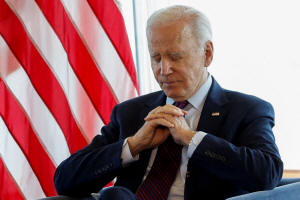Fresh round of debt ceiling talks kick off as US default worries grow
 Send a link to a friend
Send a link to a friend
 [May 22, 2023]
WASHINGTON (Reuters) - U.S. President Joe Biden and House
Republican Speaker Kevin McCarthy plan to meet over the debt ceiling on
Monday, with just 10 days before the Treasury expects to start running
out of money in what would be an unprecedented default upending the
global economy. [May 22, 2023]
WASHINGTON (Reuters) - U.S. President Joe Biden and House
Republican Speaker Kevin McCarthy plan to meet over the debt ceiling on
Monday, with just 10 days before the Treasury expects to start running
out of money in what would be an unprecedented default upending the
global economy.
Staff members from both sides reconvened at McCarthy's office in the
Capitol on Sunday evening for talks that lasted about two-and-a-half
hours, after McCarthy said he had a "productive" call with Biden earlier
in the day.
Biden also struck an upbeat tone about the conversation, telling
reporters "It went well. We'll talk tomorrow," as he arrived back at the
White House after a three-day meeting with fellow Group of Seven leaders
in Japan.
A failure to lift the debt ceiling would trigger a default that would
shake financial markets and drive interest rates higher on everything
from car payments to credit cards. Ongoing uncertainty is already
weighing on investors and stocks.
Any deal to raise the $31.4 trillion debt limit must pass both chambers
of Congress before Biden could sign it into law.
McCarthy's Republicans control the House 222-213, while Biden's
Democrats hold the Senate 51-49, making it difficult to reach a
bipartisan deal that would secure enough votes to pass.

Biden returned to Washington after cutting his Asia trip short to
address the looming debt crisis before June 1, when the U.S. Treasury
Department has warned the federal government could be unable to pay all
its bills, a deadline U.S. Treasury Secretary Janet Yellen reaffirmed on
Sunday.
Republicans are pushing for sharp spending cuts — except in defense
where they want increases — in exchange for backing an increase in the
government's self-imposed borrowing limit that would cover the costs of
lawmakers' previously approved spending and tax cuts.
Democrats want to hold spending steady at this year's levels, while
Republicans want to return to 2022 levels. A plan passed by the House
last month would cut a wide swath of government spending by 8% next
year.
Biden has said he would consider spending cuts alongside tax adjustments
but that Republicans' latest offer was "unacceptable."
The president tweeted that he would not back "Big Oil" subsidies and
"wealthy tax cheats" while putting healthcare and food assistance at
risk for millions of Americans.

[to top of second column]
|

U.S. President Joe Biden meets with
Ukrainian President Volodymyr Zelenskiy (not pictured), during the
G7 Summit at the Grand Prince Hotel in Hiroshima, Japan, May 21,
2023. REUTERS/Jonathan Ernst

McCarthy told reporters debt ceiling talks have not included
discussions about tax cuts passed under former President Donald
Trump, a Republican.
Both sides must also weigh any concessions with pressure from
hardline factions within their own parties.
Some far-right House Freedom Caucus members have urged a halt to
talks, demanding that the Senate adopt their House-passed
legislation, which has been rejected by Democrats.
Far-left progressive Democrats have pushed back against any cuts
that would harm families and lower-income Americans, with some
urging Biden to act on his own by invoking the Constitution's 14th
Amendment — an untested move the president himself on Sunday said
would face constraints.
The amendment states that the "validity of the public debt of the
United States ... shall not be questioned," but the clause has been
largely unaddressed by the courts.
Biden, who has made the economy a centerpiece of his domestic
agenda, is racing to find a solution after refusing for months to
negotiate on the debt ceiling and insisting that Republicans should
pass a "clean" unconditional increase before he would agree to any
spending negotiations.
In Japan on Sunday, Biden pressed Republicans to "accept that there
is no bipartisan deal to be made solely, solely on their partisan
terms. They have to move as well."
Republican negotiator Representative Garret Graves, asked about
spending limits versus other conservative priorities, told reporters
Sunday: "A red line is spending less money. And unless and until
we're there, the rest of it is really irrelevant."

"They know exactly where we are, they know exactly what would make
this productive. That means — yeah — both sides would have to have
compromise," McCarthy added.
(Reporting by David Morgan, Richard Cowan and Andrea Shalal; Writing
by Susan Heavey; Editing by Lisa Shumaker and Stephen Coates)
[© 2023 Thomson Reuters. All rights
reserved.]This material may not be published,
broadcast, rewritten or redistributed.
Thompson Reuters is solely responsible for this content. |